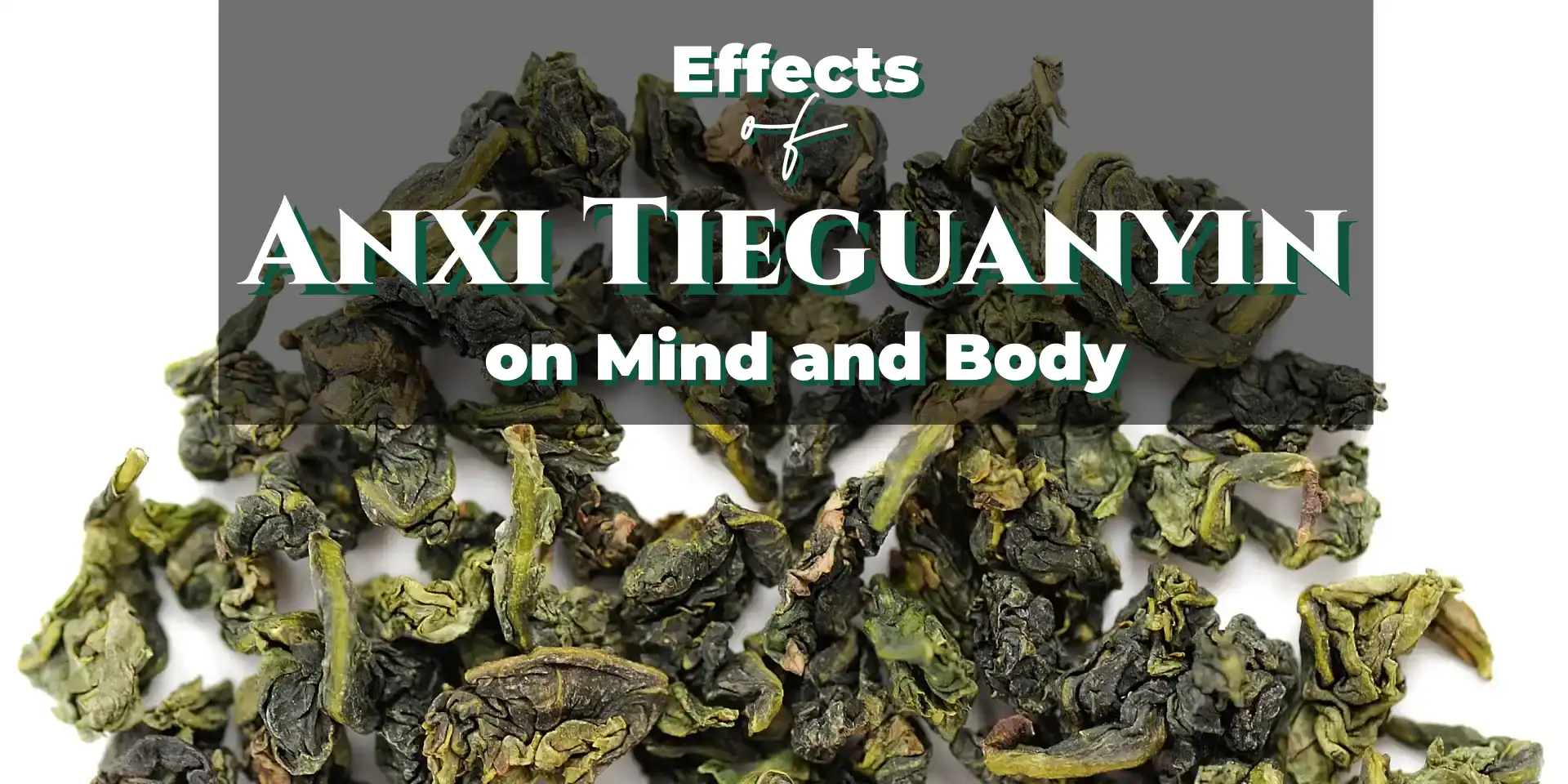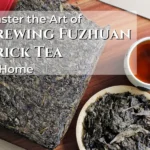Anxi Tieguanyin, a renowned variety of Chinese oolong tea, has captivated tea enthusiasts worldwide with its unique flavor profile and numerous health benefits. Originating from Anxi County in Fujian Province, this exquisite tea has gained popularity for its distinctive orchid-like aroma and complex taste. In this article, we’ll delve into the fascinating world of Anxi Tieguanyin, exploring its effects on both body and mind and why it has become a beloved choice among tea connoisseurs.
The Origins and Characteristics of Anxi Tieguanyin
Anxi Tieguanyin, also known as the Iron Goddess of Mercy, is a premium oolong tea from the lush, mountainous regions of Anxi County. This area’s unique terroir, characterized by misty hills and mineral-rich soil, contributes to the tea’s exceptional quality and flavor. The tea leaves are carefully hand-picked and undergo a meticulous process that includes withering, oxidation, rolling, and roasting.
Its partial oxidation process sets Anxi Tieguanyin apart from other teas, which fall between green and black teas. This results in a tea that combines the best qualities of green tea’s freshness and the complexity of black tea. The leaves of authentic Anxi Tieguanyin are typically tightly rolled into small, dense pellets that unfurl beautifully when steeped, releasing their full flavor and aroma.
The taste profile of Anxi tea is truly remarkable. It offers a smooth, creamy texture with notes of orchid, honey, and a subtle vegetal undertone. As you sip this green oolong, you’ll notice a lingering sweetness and a refreshing aftertaste that keeps you returning for more. The aroma is enchanting, with floral notes that can fill a room and transport you to the misty mountains of Anxi.
Health Benefits and Effects of Anxi Tieguanyin
Beyond its delightful taste and aroma, Anxi Tieguanyin boasts many health benefits recognized for centuries in traditional Chinese medicine. Modern scientific research has also begun to uncover the potential effects of this remarkable tea on human health.
One of the most notable effects of Anxi Tieguanyin is its ability to boost metabolism and aid in weight management. The tea contains catechins, an antioxidant that increases fat oxidation and improves overall metabolic rate. Regular consumption of this Anxi green oolong, combined with a balanced diet and exercise, may help support a healthy weight loss journey.
Anxi Tieguanyin is also known for its potential to improve cardiovascular health. The polyphenols present in the tea have been linked to reduced risk of heart disease by lowering harmful cholesterol levels and improving blood flow. Additionally, the tea’s antioxidants help combat free radicals in the body, potentially reducing the risk of certain types of cancer and slowing down aging.
For those seeking mental clarity and focus, Anxi Tieguanyin offers a unique advantage. While it contains caffeine, the levels are generally lower than those in coffee or black tea. This, combined with L-theanine, an amino acid known for its calming properties, creates a balanced effect of alertness without the jitters often associated with other caffeinated beverages. Many tea drinkers report improved concentration and a calm focus after enjoying a cup of this authentic Anxi Tieguanyin.
The effects of tea on digestive health are also worth noting. Oolong teas like Anxi Tieguanyin have been traditionally used to aid digestion and alleviate bloating. The warm, soothing nature of the tea can help stimulate digestive enzymes and promote a healthy gut environment. Some studies suggest that oolong tea may even positively impact the balance of gut bacteria, contributing to overall digestive wellness.
Brewing and Enjoying Anxi Tieguanyin
Proper brewing is essential to fully experience the effects and flavors of Anxi tea. The traditional Chinese method involves using a small clay teapot or a gaiwan (lidded bowl). This approach, known as the gongfu style, allows for multiple short infusions, each revealing different layers of the tea’s complex flavor profile.
For those new to brewing Anxi Tieguanyin, here’s a simple guide to get you started:
- Use 5-7 grams of tea leaves for every 100 ml of water.
- Heat water to around 90-95°C (194-203°F).
- Rinse the leaves briefly with hot water to “awaken” them.
- For the first infusion, steep for about 45 seconds.
- Increase steeping time slightly for subsequent infusions.
- Enjoy multiple infusions, as the leaves can be steeped several times.
As you sip your Anxi Tieguanyin, take a moment to appreciate its aroma and flavor. Notice how the taste evolves with each infusion, revealing new nuances and subtleties. Many tea enthusiasts find that brewing and enjoying this tea becomes a meditative practice, offering tranquility amid a busy day.
It’s worth noting that the quality of the tea leaves dramatically impacts the overall experience and effects. When seeking authentic Anxi Tieguanyin, look for reputable sources to provide information about the tea’s origin and processing methods. High-quality Anxi Green Oolong should have tightly rolled leaves that unfurl beautifully, releasing a rich aroma and yielding a clear, golden-green liquor.
Conclusion
In conclusion, the effects of Anxi Tieguanyin extend far beyond its delightful taste and aroma. From its potential health benefits to its ability to promote mental clarity and relaxation, this exceptional tea offers a holistic experience for both body and mind. Whether you’re a seasoned tea connoisseur or new to the world of oolong teas, exploring the nuances of authentic Anxi Tieguanyin can be rewarding. So why not brew a cup, inhale its enchanting aroma, and discover the effects of this remarkable tea for yourself?
References
- Chen, Z. M., & Lin, Z. (2015). Tea and human health: biomedical functions of tea active components and current issues. Journal of Zhejiang University-SCIENCE B, 16(2), 87-102.
- Kuroda, Y., & Hara, Y. (1999). Antimutagenic and anticarcinogenic activity of tea polyphenols. Mutation Research/Reviews in Mutation Research, 436(1), 69-97.
- Li, Y., Jiang, H., Huang, G., & Wang, X. (2017). Anticarcinogenic effects of Tieguanyin tea and its mechanisms. Journal of Tea Science, 37(1), 1-10.
- Xu, Y., Chen, Y., & Wang, Z. (2018). Tieguanyin tea: Origin, production, and its health benefits. In Global Tea Science: Current Status and Future Needs (pp. 315-331). Burleigh Dodds Science Publishing.
- Zhang, L., Ho, C. T., Zhou, J., Santos, J. S., Armstrong, L., & Granato, D. (2019). Chemistry and biological activities of processed Camellia sinensis teas: A comprehensive review. Comprehensive Reviews in Food Science and Food Safety, 18(5), 1474-1495.


